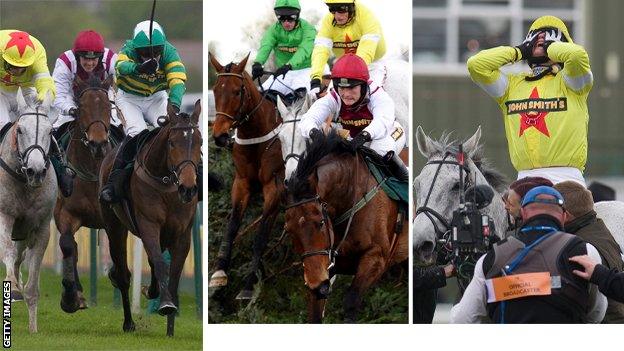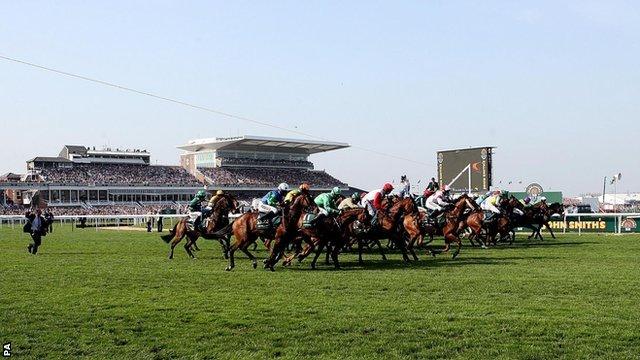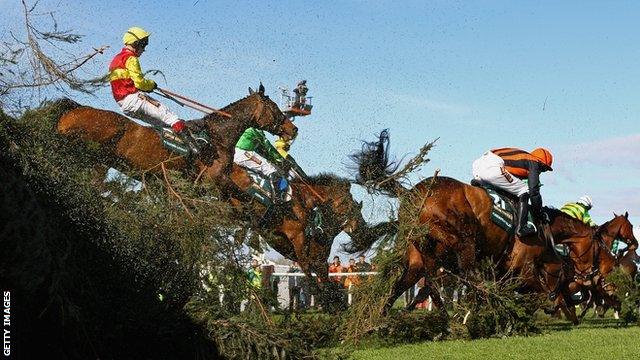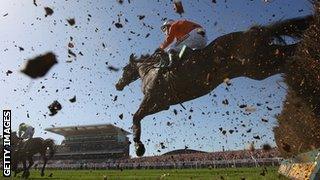Grand National: A rollercoaster ride, by those who know it best
- Published
- comments

It is the biggest, scariest, most exhilarating steeplechase in the world, a four-mile rollercoaster of flying spruce, tumbling bodies and thundering hooves.
Most of us humble punters will get no closer to the visceral thrill of the Grand National than the stands at Aintree or our television screens. What is it truly like to fight and fall inside the rails, to watch the horse you own or train launch themselves over the dark-green precipice that is Becher's Brook or come snorting down the Elbow with history in its sights?
Saddle up and come for a ride. Your guides: jockey Sam Waley-Cohen,, external fifth on Libertine in 2007, second on Oscar Time two years ago; trainer Kim Bailey,, external National winner with Mr Frisk in 1990; and owner Graham Regan,, external whose much-loved Niche Market pulled up injured in 2010 and then led in 2011 before finishing fifth.
THE NIGHT BEFORE
Liverpool is a city awash with Grand National pilgrims - punters, owners, trainers. Who can sleep, who can keep their nerves on a short rein?
GRAHAM REGAN (GR): "The National is all-consuming. From the moment you enter it you're watching every bit of news - who's in, who's out, where your handicap is - and it drags everyone in, from your immediate family, and then all your friends, and then anyone who's ever known you.
"You can't appreciate until you're involved in it how huge it is. From the time you pull up in Liverpool, the whole town is just mad for it. Aintree is like a disco with horse-racing."
Imperial Commander primed for Aintree
SAM WALEY-COHEN (SWC): "The big thing about the National is that it's dangerous for horse and jockey. So the night before I always want to have a good meal, because you never know what the next day is going to bring."
KIM BAILEY (KB): "You feel nervous. You cannot relax. You're just drifting off to sleep when you start having sudden illogical thoughts. 'Did I put his shoes on properly?' 'His saddle - it'll slip...'"
MORNING BREAKS
Across the country, racing fans and dabblers alike are perusing papers and websites, seeking tips, making wagers. At Aintree, the combatants assemble.
KB: "Bacon butty with the owner, stroll round the course. There's absolutely nothing you can tweak at that stage. Everything you can do with the horse is done; you can study the conditions all you like, and it won't make an ounce of difference."
SWC: "I think about the process. Which horse would I want to be close to in this race? Which horse will give me a good lead? Which one might bring me down? How can I maximise my mount's strengths, and neutralise the opposition?"
GR: "Nerves, horrible nerves, from the time you walk into Aintree. They say you should enjoy it, but then you walk down and look at The Chair, and it's just massive…"
INSIDE THE WEIGHING ROOM
Odds are shortening. Time is disappearing. In the jockeys' private moments, the tension kicks hard.
SWC: "They always say that the loud ones go quiet and the quiet ones are suddenly the loudest. It's a race that triggers extreme emotions: the jockey who wins will have their name made forever, but some others are going to get hurt.
"You sit there knowing statistically that only one and a half of you out of every four are going to complete the course. And of those who don't get round, one of you might get hurt.
"If you're calm in the weighing room before the National then you're king. The horse picks up the vibe of the jockey. There's a conscious effort to be fatalistic about what's going to happen, but at the same time everyone's nervous, so it becomes a game."
THE PARADE RING
Less than 30 minutes to go. Check the skies, check the buckles, breathe deeply.
GR: "I'm 46 now, and I've watched every National since I was three. In Dublin the whole family used to sit down to watch it. It united us - the Eurovision and the Grand National.
"When the Niche came in to the pre-parade, it all came to a head. I just looked at him, and just through nerves I vomited. As they came in to put the saddle on him, I was being sick at the back of the box.
"Pure nerves. They are ferocious, and they never really go. The last thing I said to Harry, our jockey, was: 'If you get anywhere close, that whip isn't for balance.' I love that horse; I was only trying to make myself feel better."
KB: "Once you've put the saddle on and the jockey's legged up, it's outside the trainer's control. You are reliant on their ability and a good bit of luck. And the National brings out more of the luck than most races because there's so much happening. There are so many imponderables."
CANTERING TO THE START
It is the final calm before the storm, the last moments of peace for jockey and horse. Then three uniformed bandsmen trumpet the fanfare, and a huge cheer erupts from the packed grandstands.
SWC: "It's like someone giving you a slap in the face. You're hit with a big bolt of adrenaline: it's about to happen. And there's no turning back.
"Reality levels you. 'This horse isn't going to get me round.' 'This horse might win it.' This is it. Get in position. Fight your fight."

THE START
A thin orange tape is stretched across the course. Horses circle.
KB: "You get that terrible knot in your stomach, and there's no other race that does that to you. It's the one race where the trainers who don't get on or the owner who doesn't like another owner will actually wish each other luck. And actually mean it.
SWC: "The start is like the moment a scrum crouches to engage. It's not the frenetic, stressed moment it appears, but there's about to be a huge impact, and you need to be in the right place. Your race can be made or broken then. Get behind a horse who isn't a great jumper, or fail to get yours into a rhythm, and things will fall apart."
KB: "It is a race that sits there and looks at you, and you look back at it, and by the time you're in the stands you're a nervous wreck."
GR: "It's excitement, it's fear, it's dread. And it's the greatest buzz you'll ever have."
AND THEY'RE OFF!
With a roar from the tens of thousands crammed around the course, the tape flicks up and the horses sprint away. To the first - for some, too, the last.
SWC: "In most races, jumping fences is incidental. Most of the time you're thinking about your tactics and positioning; the fences are just part of the process. In the Grand National, it's the other way round: you think about jumping the fences, then you think about your tactics."
GR: "Once you get safely over the first fence, weeks and weeks of pressure and nerves go out of the window. We were blessed with the Niche, because as a jumper he was bomb-proof. I never thought I'd see him fall. But you're concerned, because you know what can happen."
THE 40-STRONG CHARGE
Surrounded by a sea of flashing colours and glistening quarters, nose to mount's mane, the jockeys search for space.
SWC: "Horses that find a good rhythm are like a well-balanced boxer, able to respond to whatever comes at them. But if you're off balance - if you're going too fast - there's a real risk the horse will just run at the fence and fall on the back side.
"You get into a position you're happy with, hold that position and then get the horse in a rhythm that's measured, controlled and good to meet the fence at whatever stride it meets it, without rushing or getting under it."
After two standard fences comes the third, a big open ditch and the first real challenge.
SWC: "You want a clear sight of the fence. You don't want a horse to take the ground in front of you.
"If you can't hold your position, you start to get swamped - it's like a wave coming round you. And like when you're surfing, you can't catch up with that wave once it's gone."

BECHER'S!
To the sixth, and the most infamous obstacle in the entire race: Becher's Brook, external - steepling, on a slight left-hand turn, with an infamous landing.
SWC: "It's a moment of commitment. Horse and jockey become one animal. Your balance moves with the horse and gravity. If you're coming down a bit steep, your weight needs to be further back; if you've jumped it long and flat, you can afford to be in a more neutral position.
"Imagine skiing fast over the lip of a hill. You don't know what awaits. Just because you're in the air it doesn't mean you're going to land it."
THE ADRENALINE UPSTAIRS
For those watching in the grandstands, eyes on the big screens, binoculars in hand, powerlessness mixes with stomach-turning anxiety.
KB: "It hits you at the start, the first fence, the first open ditch and at Becher's. Once you're past Becher's for the first time, you allow yourself a little sigh of relief that you've got that far. Then, when you come past the stands with a circuit to go, that's where the race really begins."
IN THE MAELSTROM
Over Foinavon, cutting the Canal Turn, scraping over Valentine's. Horses are falling, being pulled up, running loose. Keep thinking, keep plotting.
SWC: "Getting round Aintree is about what you do 30 yards from the fence, not going over it. Once you get to the fence, there isn't anything else you can do, but 40 yards away you have the options. You can move your horse relative to another one; you can ask it to attack it, or say 'Hey hey hey - let's get defensive here and let it come to you'.
"Surrounded by that many horses, you're not just riding yours but all the others as well. You're thinking, 'That one's been jumping a bit left, that one's not jumping very well, I don't want to get too close to that one. If that one falls as we go over, where can I go?'
"Sometimes you know you're not where you want to be. You know you're in trouble, but you don't have any options. Then you just have to hope.
"And that's the moment of real fear; it's like driving round a corner too fast on ice. 'I don't want to be here, but I am here, so let's make it work.'
IN CONTENTION
Over the fearsome Chair, across the wide water jump. Onto the second circuit. Who's involved?
KB: "You are looking at the horses all around yours. There is that moment when they turn in off the Melling Road, and you suddenly spot your horse. That's when you start to get really excited, and it's important not to stand too close to your owner, or he might hit you."
CONSTANT CALCULATIONS
Bodies flat out, the jockeys' minds whirr.
SWC: "Your strategy is constantly changing. You're trying to work out the probability of things happening around you. If you've got a horse outside you who could cause trouble, you could go wide, or try to take a pull to get away from him. But you have to be making a decision, and basing it on the probabilities of what it might do.
"Too much is going on for you to do that consciously. You're also going 30 mph. It's like standing on the roof of a Mini going along a race track, surrounded by lots of other Minis. You have to react incredibly quickly."
STARTING TO BELIEVE
GR: "The Canal Turn the second time around. Back onto the Melling Road. All this stuff comes back to you from watching it as a kid - and we're up there, almost leading! The fear has gone. You're full of hope."
SWC: "The shouting and swearing is relentless. 'Keep straight! Keep straight!' A hole that was there for you to go through one stride has gone the next. The jockey that moves across might not know you're there - you have to let him know."
INTO THE FINAL TURN
The cavalry charge has been reduced to a handful of contenders. One of these horses is going to win it. But which one?
GR: "I'm in the owners' and trainers' stand. I'm going, 'Hang on to him, lad! Hang on to him!' and so all the people standing around me realise I own the Niche, and they all start roaring for him too.
"We take the fourth last alongside the leader. You stand there and think, 'Jesus, we might win this…'"
SWC: "There is a chimp on your shoulder shouting, 'We could win this!' And there's one on your other shoulder shouting, 'Concentrate!'
"Ride on instinct and experience. You have become part of the horse. You are its brain, and it is your body."
TWO TO GO
The leader falls. Your horse - the horse you found, raised, trained every frozen winter day - hits the front.
KB: "We were suddenly clear. I've only had two cigarettes in my life, and I had them both at the same time. From the third last onwards, I was watching every single stride, watching every single moment that the pursuers were getting closer."
SWC: "Galloping into earshot of the stands is like galloping into the mouth of a lion. The noise is unbelievable.
"When you're going at the line, the noise carries you along. It can intimidate the horse, because no horse has ever come across that before."
THE FINAL FENCE

Twenty-nine cleared. One to jump.
SWC: "Throw yourself at it. Ride it conservatively and you know your race has gone. You're there to take your chance, and the only way that can happen is to go for it."
KB: "It's the most dreadful agony. The last thing I had said to our jockey Marcus Armytage had been, 'For God's sake don't hit him, because you'll be so tired you'll fall off'. With a fence to jump I was shouting, 'For God's sake hit him!" - and he never did."
INTO THE ELBOW
The furious finale. Nine long minutes of the most intense physical and mental effort, four long miles of effort. Who has anything left? Who will stay strong?
SWC: "You're travelling, you're travelling… and then suddenly you know you're in trouble. It's like a car running out of petrol. You're pushing the accelerator, but there's nothing left, almost as if the ground has started to rise.
"It's the most impotent feeling in the world. You can't get past the leader, and you can't work out why they're going faster than you, and there's absolutely nothing you can do about it."
THE WINNING POST
KB: "I can remember everything - the sheer shock of the whole thing, suddenly people hitting you on the back, you trying to fight your way through. You're taken along on a wave. Your legs are trying to move you one way and the crush takes you another."
SWC: "It's a moment of intense loneliness, because it's just you and the horse, and all that hope and expectation and excitement is suddenly gone.
"There's relief you're in one piece, and a release of tension, but the evil chimp is shouting again - 'Did you do that right? Where did you go wrong?'"
KB: "I ran over to to grab the horse, and a policeman tried to stop me. 'You're not going anywhere near that!' he yelled, and pushed me away."
GR: "Just to be part of it - to see your horse's colours cross the line with most of the field gone or trailing. You think, 'Hell, this is some day out!' It is the absolute thrill of a lifetime."
THE LONG NIGHT AND LATE MORNING
Champagne, embraces from friends and strangers, interviews, trophies, more champagne. How did we get here? What time is it?
KB: "I can safely say that by the time I got to bed, very late the next morning, nothing could have kept me awake. I was gone.
"You suddenly collapse - you've had all that excitement, you've had all that alcohol. You think you can keep going but it suddenly hits you, and all you want to do is lie down."
SWC: "You're chewed up. You're totally spent. There is nothing left to give. I am absolutely wrecked for a couple of days - not physically, but emotionally and mentally.
"You've released excitement, fear, anger, greed, expectation, envy and pain. You try to keep a level on it, but it's a raw environment. Your emotions are out there and it's impossible to hide them."
THE AFTERMATH
KB: "The Grand National is yours for 12 months. You get thousands of letters from punters, because it's the people's race. It's the one race that the whole world takes notice of.
"Aged 19, I spent some time in Sydney. When we won the National I received a letter from an Aussie I briefly worked with there, addressed to 'Kim Bailey, Grand National trainer, England'. It got to me without a problem."
- Published5 April 2013
- Published4 April 2013
- Published4 April 2013
- Published5 April 2013
- Published5 April 2013
- Published4 April 2013
- Published27 March 2013
- Published27 March 2013